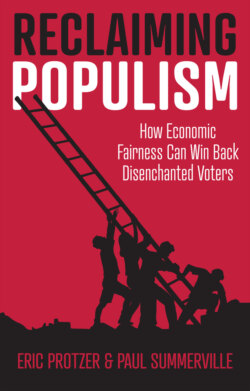Читать книгу Reclaiming Populism - Eric Protzer - Страница 6
Foreword
ОглавлениеEnthusiasm for illiberal populist ideas is at fever pitch in nations like the United States and the United Kingdom, and democracy is under threat in a host of other developed countries. Never has it been more important for liberal thinkers from the political mainstream to correctly diagnose what drives this generational challenge and devise corresponding policy prescriptions. With that goal in mind, Reclaiming Populism argues that vulnerability to the most severe forms of populism observed in the rich world today can be explained by economic unfairness, where citizens do not get the opportunities and outcomes they believe they deserve. The book then offers concrete direction on how policymakers can identify and rectify sources of economic unfairness in their respective countries, whether they wish to guard against illiberal politics or simply make the lives of their citizens more just.
Crucially, our thesis strongly departs from conventional economic explanations for contemporary rich-world populism. The typical arguments suggest that economic loss or income inequality help to explain the populist backlash. We contend instead that populism is a consequence of more sophisticated forms of economic injustice. Reclaiming Populism holds that it matters both why individual citizens get the economic outcomes they do and whether those outcomes are fairly deserved. From this perspective, an economy is fair when each citizen has a real chance at success and when rewards are approximately meritocratic. We make this case not only by referencing existing academic research, but also by showing that low social mobility – an important type of economic unfairness, in which citizens’ earnings are deeply influenced by how wealthy their parents were – correlates with indicators of mass support for populism in a variety of settings.
Reclaiming Populism is divided into five chapters. The book exposes the most prominent theories for populism as insufficient or plainly wrong; details why biological and cultural evolution has led citizens across the developed world to especially value fairness; shows how economic unfairness is the necessary condition for contemporary populism in high-income countries; presents a framework of equal opportunity and fair unequal outcomes as policy inputs to economic fairness; and, finally, proposes a diagnostic process to identify binding constraints to economic fairness based on methodology originally developed by Harvard University’s Growth Lab.
We received vital help and feedback from many colleagues and friends. We want to thank three in particular. Ron Rogowski gave especially helpful insight on our quantitative work linking social mobility to populism, and on the broad organization of the book’s ideas. Rod Tiffen suggested that we specify fair unequal outcomes as a category of vital policy inputs in order to differentiate them from inequality which arises from cheating or rent seeking, an innovation that permits a cleaner discussion of the idea of fairness. Our editor George Owers from Polity suggested, among other important things, that our original working title “Defeating Populism” was imprecise because we argue that populism stems from genuine grievances over economic unfairness. We consequently shifted the book’s framing toward the current title, Reclaiming Populism.
Our book has been written on the shoulders of many others alive and dead. We are most grateful for their assistance, and are, of course, responsible for any errors or omissions.
